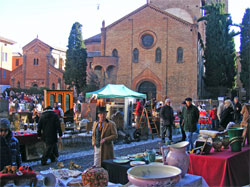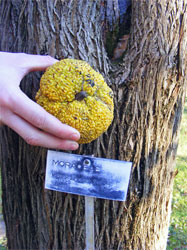




CdP, 11 January 2012
We’ve been in Bologna. I like Bologna. It’s the closest Italy comes to Oxbridge. But it has that edge, a stylishness and sophistication that places it firmly in Italy’s monied north – however hard the crisis is biting and however many straggle-haired students shuffle about in the university quarter.
I like its arcades, which wind along streets even in areas which could never be classified as centro storico. (L once interviewed Umberto Eco here, and had a lengthy conversation about the irony of living in a damp northern city where you could get around just fine without an umbrella).
I like its shop fronts with their old-fashioned signs; in fact, in many cases just plain old signs, and not necessarily corresponding to whatever it is they’re selling inside these days. Contemporary signs stand out as cheap and crass: who, I wonder, allowed Feltrinelli to plaster their bright red neon name all over the shops at the foot of Bologna’s towers? It made me feel like boycotting the place.
I like its museums which are scholarly and intricate rather than full of in-your-face masterpieces: the room full of wax models of badly presenting foetuses or the sleeping wax lady made so that her organs could be removed one by one by curious med students; the great walls full of boastful plaques of centuries of international students.
I like its neatness and cleanliness and its lack of city centre traffic, especially over the January 6 holiday weekend.
Yet even here, where they do so much right, they can’t do gardens.
As I always try to do, I sought out the city’s botanical garden. I needed a bit of green because – apart from two magnificent Gingko biloba in one little square, and a massive Diospyros kaki reaching through office windows in another – I really hadn’t seen much in the way of vegetation for three days. My expectations weren’t unreasonably high: what can one ask of a garden on 9 January, after all? What I found was even more under-whelming than I had expected.
Signs warn you off grass which is so thin and water-logged (waterlogged? when it hasn’t rained for weeks?) that you don’t particularly want to set foot on it anyway. Stipa and Phragmites have been mown and left to choke the minuscule lake. A tiny mound with a few stones and a handful of alpines is marred by orders to ‘keep to the path’ (there wasn’t anywhere else to go, really). In the garden of simples, not enough gravel sinks well below the level of horrible plastic stabiliser. The enticing-looking greenhouses are firmly locked – and it would have been difficult to climb over the flower-pot and potting debris strewn about to get into them anyway. And towards the back of the long thin patch, a truck full of very noisy men is watching one chainsaw-wielding colleague being hoisted up to lop very indiscriminately at some kind of poor little oak tree.
Now, I’m perfectly prepared to be told that in summer this is a fine spot: leafy and cool and full of the joys of the perennials, the sad remains of which were visible poking out from ugly, low concrete cylinders sticking out of the ground here and there. And of course the herb garden will be lovely come spring (as long as they bring another truckload of gravel).
But C – certainly no great garden expert or connoisseur – reacted immediately as we entered saying “the one in Cambridge doesn’t look like this in winter!” And it’s true. With some imagination and a lot more maintenance, there’s no reason why this university botanical garden shouldn’t be just as fascinating – if less leafy and flowery – in winter as in summer. It’s such a pity.
What happened to that Italian Renaissance garden-making instinct which produced so much intricate, symmetrical, super-manicured perfection? Did it over-extend itself and wear itself out? Or did our unstructured English style come along and immediately appeal to some part of the Italian soul which equated ‘wilderness’ with ‘license for neglect’? Did we Brits put an end to Italian garden rigor?
********
Back in CdP, it’s startlingly blue. I’m trying to instil in myself a sense of urgency – of a need to kick-start 2012 and get things done right from the word go. Yet here we are on 11 January and I’ve barely done a thing in the garden, except replant the freshly transplanted roses which some pesky animal (porcupine?) keeps digging up, presumably to get to the wild iris bulbs beneath. If my roses survive nights of exposed, deep-frozen roots, I shall never worry about kid-glove, pussy-footing care when transplanting roses ever again.


Or read the blog...

